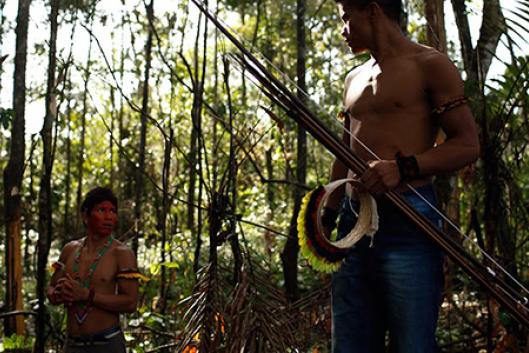In its role of accompanying and supporting popular and grassroots struggles in defense of territories and forests, WRM has been listening and learning from numerous meetings, exchanges, dialogues and visits with our allies in different regions of the Global South and Global North. In this walk, we have a deep admiration for the countless and diverse resistance movements that rise up and are sustained, despite the most unimaginable difficulties.
Communities continue to resist despite the violence exerted upon their territories and lives, the immense pressure and multiple plans to further expand the extractive model under the slogan of “green solutions,” the sexual harassment and violence suffered by many women and girls who live in and around extractive concessions (in particular industrial monoculture plantations), the contamination of their soils, food and water sources, the intimidation and criminalization, the marginalization and structural racism, and so many other ills. Despite all of this, the struggles go on. Despite all of this, there is hope to be found.
We invite you to read a very powerful reflection from an activist from the Interstate Movement of Babassu [Coconut] Breakers. Rosalva Gomes depends on gathering babassu palm coconuts for her subsistence. She shared her experiences and lessons about resistance and its challenges at a meeting of leaders and representatives from communities affected by industrial tree plantations in Mozambique, Tanzania and Brazil.
“There is no ready-made recipe for resistance. It depends on each territory and the scope of each territory. It depends a lot on the internal strength of each territory and the specifics of each country, state and community. But there is a unifying strategy, because there is one thing we are sure of: if we do not strengthen and join forces, we will suffer very great impacts, even greater ones [than we currently experience]. We are already going through many difficulties. Unifying forces among communities and organizations is one of the paths of resistance.”
She shares the following, speaking of the Suzano Pulp and Paper mill in Imperatriz, Maranhão, Brazil. Since 2014, Suzano has produced around 1.65 million tons of pulp and 60 thousand tons of toilet paper annually. Along with the highways, the constant transport of wood and the massive influx of workers, this company has caused much devastation for populations in the area:
“In the community of Curvelandia (here near Imperatriz), which is a community composed of rural workers, the conflict began with the trucks transporting eucalyptus logs. In the past, those trucks would go down a road behind the community, but now they wanted to go through the community. On the first day, the community organized, got together and closed the road. The police arrived with an air of superiority, wanting to protect the company. But the community closed the road. The company arrived, negotiations began, and the community demanded a meeting because they were not being heard. After much insistence, a meeting with Suzano took place; the community asked that the trucks no longer go through there. Meanwhile, supporting organizations were thinking of ways to communicate and warn about the case—because one thing that companies do not like is for their crimes to be made visible. We made a video telling the story, we prepared a complaint, and now we are sending it to the national council for human rights. The trucks have decreased in number. But the company tried to intimidate us; it was watching and sent the message of ‘we are on alert.’
How did the community achieve this? Everyone in the community participated: there were men, women, old people, and young people...the whole community. They signed a petition and filed a protocol at the municipality. They did not consult with anyone. It is a slow process. The uprising has to start from the inside out. There is no greater force than that. Supporting organizations help a lot, but that strength from within, that dedication, that constant warning, that knowing how to warn, how to send a message, how to get this or that person to participate...this path that we are on is much stronger, and it strengthens the forces that help us.
So we talk about resistance, resistance...but we need to find a way to face the situation, because many times we just endure it, right? But we have to face our situations, take our own contexts into account, and impose ourselves in some way.
The sowing of struggle and collective organization are two strategies, which vary according to the specificities of each region and country...and we see that they do work.”
Let us all be part of the collective resistance, from our own contexts and spaces of struggle!
